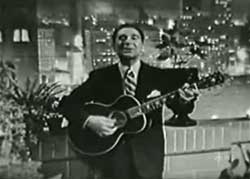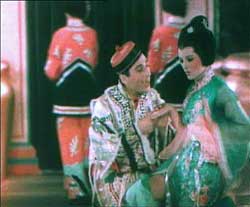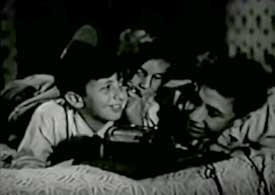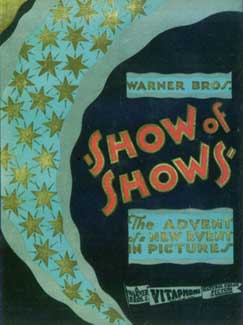Part II: Punishing You With More of Nick Lucas
 Art Baker, director & host of the early '50s television series You Asked For It, reads a letter from a woman who can no longer get out of her bed & says the only way she'll ever be able to hear her favorite singer again is if Art will track him down & have him on an episode of You Asked for It.
Art Baker, director & host of the early '50s television series You Asked For It, reads a letter from a woman who can no longer get out of her bed & says the only way she'll ever be able to hear her favorite singer again is if Art will track him down & have him on an episode of You Asked for It.
This was a show that presented such fascinating acts as a woman kissing a cobra & a man painting canvasses by means of live worms or Bela Lugosi doing a vanishing-girl-in-cabinet magic trick while decked out as Dracula, ending with the warning "You Asked for It."
The 1952 episode at hand gives the bedridden woman's favorite singer Nick Lucas about four minutes to sing four songs. He does abbreviated versions of "Tip Toe through the Tulips," "Painting the Clouds with Sunshine" (with the very gay lyric "If I'm acting gay/ I'm not really that way"), "Come to Me My Melancholy Baby," & "Bye Bye Blackbird."
All four numbers all pretty much robbed of any character or color, but are nevertheless endearing. Nick's spot is included in the videoYou Asked for It Volume I, a television memories compilation. Also, at last check, it was posted at youtube.
 The Show of Shows (1929) was a very early two-strip color sound film. Unfortunately its surviving prints are black & white, except for one reel containing "An Asian Fantasy" which survives in technicolor.
The Show of Shows (1929) was a very early two-strip color sound film. Unfortunately its surviving prints are black & white, except for one reel containing "An Asian Fantasy" which survives in technicolor.
With a big cast of big names, it's an all-out vaudeville context of comedy sketches & songs by every big star Warner Brothers had at the time, except for Al Jolsen as the most noticeable missing performer. Jolsen is, however, impersonated by the emcee, singing "Rock-a-bye Your Baby with a Dixie Melody."
The majority of the "big" cast would not last long into the sound era but so many acts are shown there are plenty who remain familiar even to the present time, including a number of very young performers who weren't yet known at all but whom Warner Brothers was grooming. So it's a mix of actual vaudeville acts, silent film stars, & young performers who'd be the next generation of stars.
Noah Berry appears in a pirate skit. Irene Bordoni sings "One Hour of Love." Chester Conklin, Grant Withers, & Ann Sothern (still known as Harriette Lake) do "A Bicycle Built for Two." Bull Montana & Winnie Lighter sing a parody version of "You Were Meant For Me" & Winnie has a production number with a bunch of guys in drag, parodying "Singing in the Rain."
John Barrymore does a fragment of Shakespear totally pokerfaced. Among the plethora of cameos we'll see Mary Aster, Ben Turpin, Beatrice Lillie, Douglas Fairbanks Jr., Loretta Young, Ted Lewis & His Orchestra, a great many others, even Rin Tin Tin the wonder dog who barkingly "introduces" a Nick Lucas number.
Nick has three numbers in the film. Standing in front of a curtain straight & stiff, accompanying himself with simple guitar, he sings "The Only Song I Know" in honor of his own often lauded but in reality only moderate guitar skills:
"It's a melody my guitar keeps playing/ That I've longed to sing to you for days/ Just a melody in my heart forever/ Saying let me love you, let me love you always."
Although he's blatantly not a great talent, there is definitely a simple charm that makes it somewhat understandable he'd achieve a high level of stardom, however transiently, at that time, & trade on that transient glory the rest of his life.
Given that he began his career in a glorious jazz age one might wonder that he got as far as he did, but for a parallel of lesser vintage, imagine days when a young Little Richard was screaming out in the new language of rock & roll, but selling few records compared to Pat Boone covering Little Richard's "Tuti Fruiti." Nick was the Pat Boone of his day.
He does another solo standing center stage, singing "Lady Luck," while a fellow sitting stage left is playing with a puppy. This is insult-comic & emcee Frank Fay, who sang a diddy to the puppy.
Nick sings the simple melody in a high voice while accompanying himself with equally simple guitar: "Lady Luck, i've got you on my mind/ So won't you please be kind to me/ Oh Lady Luck, don't give my hopes a rest/ And I'll be happy as can be."
His version of "Lady Luck" is simple & lowkey in his usual mode, but it is also sung as a big producton number for Alexander Gray & Ted Lewis.
Nick had an earlier number in the film, staged as an extravaganza, "Li-Po-Li" written by Edward Ward & Alfred Bryan & performed as part of a big sketch called "An Oriental Fantasy."
It's a garrish sequence with Nick in a mandarin's cap & robe to perform an elaborate song & dance with faux Asian gals, including Myrna Loy, tasteless kitsch but rather fun, & happy this sequence survives in technicolor. The bizarre choreography with ladders was duplicated in Ken Russell's The Boyfriend (1971).
 At a hair over three-quarters of an hour, Disc Jockey (1951) tells a thin story starring Ginny Simms as Vickie Peters, Jane Nigh as Marion, Lenny Kent as Happy, & so on.
At a hair over three-quarters of an hour, Disc Jockey (1951) tells a thin story starring Ginny Simms as Vickie Peters, Jane Nigh as Marion, Lenny Kent as Happy, & so on.
There are also a great many performers as themselves: Tommy Dorsey, Nick Lucas, Sarah Vaughn, Hack Fina, Red Norvo, Joe Venuti, Foy Willing & the Riders of the Purple Sage, Red Nichols, Ben Pollack, Herb Jeffreys, The Weavers, Vido Musso, George Shearing, & Russ Morgan. For the el cheapo Monogram studio, this amounts to a major motion picture, not the public noticed.
A radio DJ (Michael O'Shea) selects Ginny Simms (Vickie Peters) to prove a point. He intends to make her a star just by radio exposure of her records, proving that exposure on television isn't necessary. It's not much of a story.
Nick Lucas's part is substantive considering how many cameos leap through the thing. Two boys are shown trying to get a radio station to come in on their crystal set, a type of radio that kids in ye olden days could make from a kit. We see the kids laying on their bed leaning close to the crystal set listening into the small earpiece.
A disc jockey preparing to play a record at a nearby station introduces "the singing troubadour" Nick Lucas. It then cuts again to a stage where Nick is performing. The film is not supposed to be a supernatural story, & this manner by which performers materialize on stage by playing their records is given no context, it just happens.
The song sucks so bad that when he sings lines like "Through the pasteur with the one that I adore," I assumed he was having an affair with one of the cows. "We'll climb through the clover/ Rush through the roses/ Dance with a dandilion."
But jump-cutting back to the boys laying on their bed with the crystal set, it's clear that Nick really did pitch his songs to the kiddies, & that's sweet, it's just hard to imagine children were a big audience for Nick Lucas.
copyright © by Paghat the Ratgirl
|



